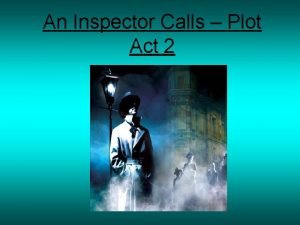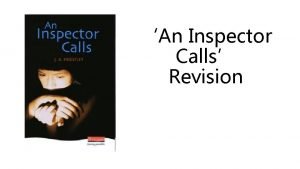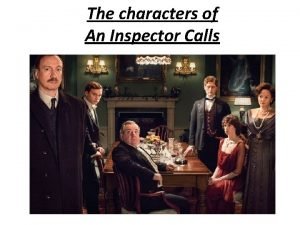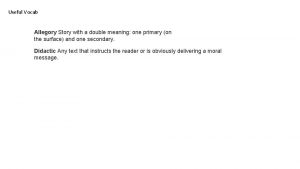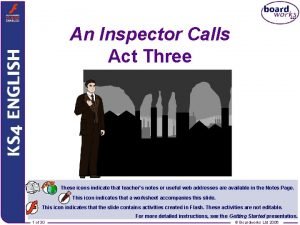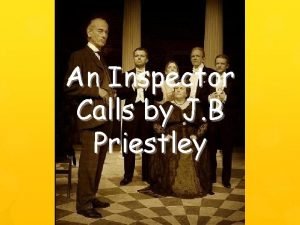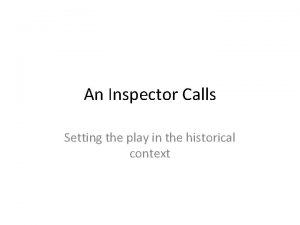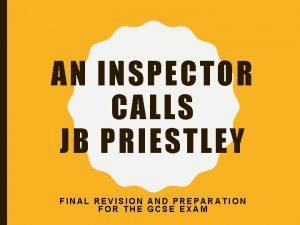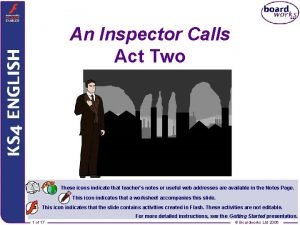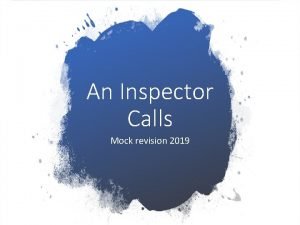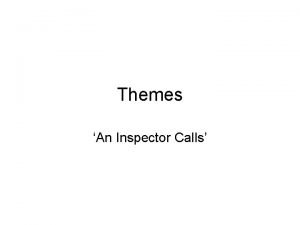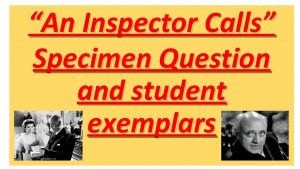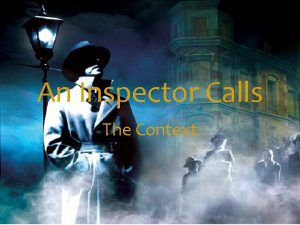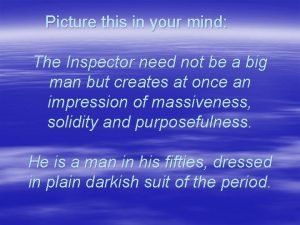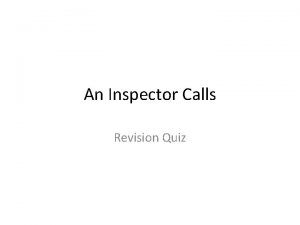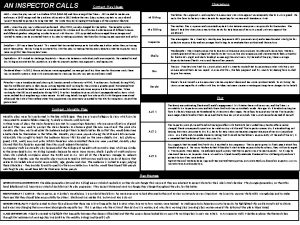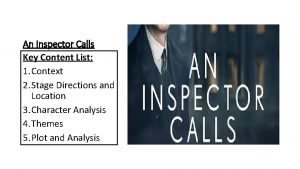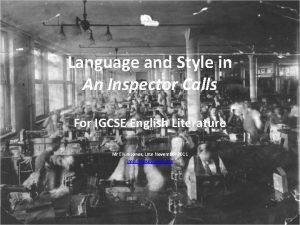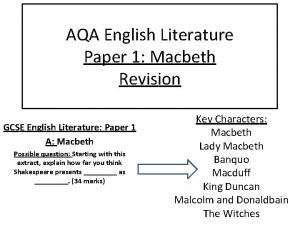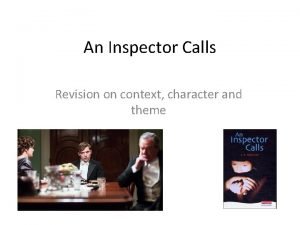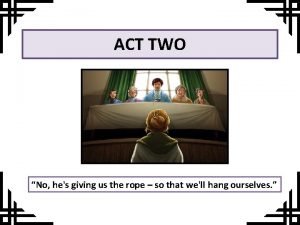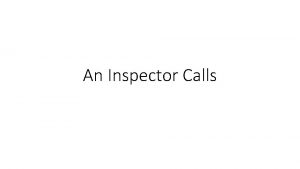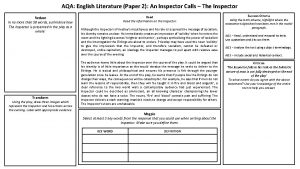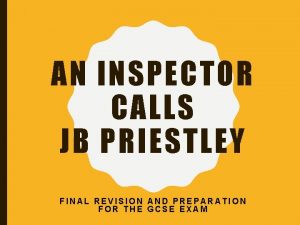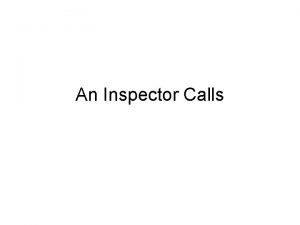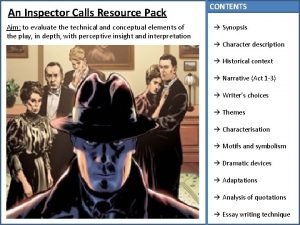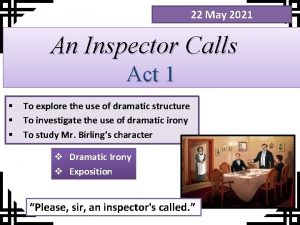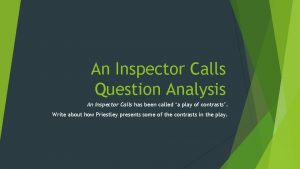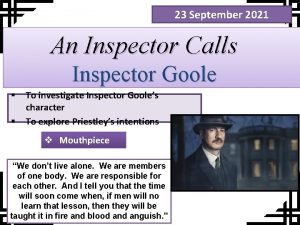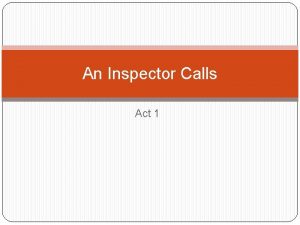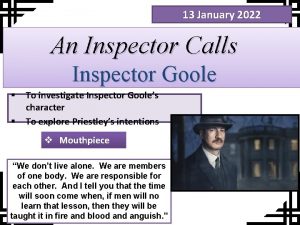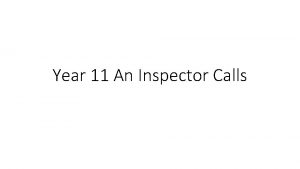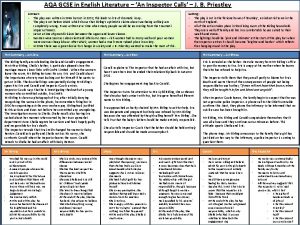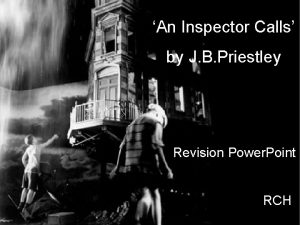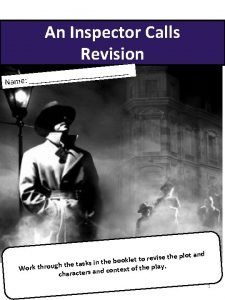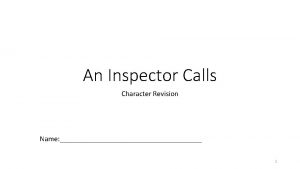GCSE Revision An Inspector Calls Miss L Hamilton








































- Slides: 40

GCSE Revision: An Inspector Calls. Miss L. Hamilton Extend your Learning @ Bishop Justus Year 11: An Inspector Calls Revision

GCSE Revision: An Inspector Calls. You will be given the choice of two questions. You only need to do one. It is worth 30 marks with 4 marks awarded for SPa. G. You should spend about 45 minutes on this section of the exam. Miss L. Hamilton Extend your Learning @ Bishop Justus An Inspector Calls is on Unit 1 of your English Literature GCSE.

GCSE Revision: An Inspector Calls. Miss L. Hamilton Extend your Learning @ Bishop Justus You are being assessed on AO 1 (10%) and AO 2 (10%) AO 1 • respond to texts critically and imaginatively; select and evaluate relevant textual detail to illustrate and support interpretations AO 2 • explain how language, structure and form contribute to writers’ presentation of ideas, themes and settings

GCSE Revision: An Inspector Calls. Extend your Learning @ Bishop Justus Let’s look first at the play’s characters

GCSE Revision: An Inspector Calls. Extend your Learning @ Bishop Justus Arthur Birling • He is described at the start as a "heavy-looking, rather portentous man in his middle fifties but rather provincial in his speech. " • He has worked his way up in the world and is proud of his achievements. He boasts about having been Mayor and tries (and fails) to impress the Inspector with his local standing and his influential friends. • However, he is aware of people who are his social superiors, which is why he shows off about the port to Gerald, "it's exactly the same port your father gets. " He is proud that he is likely to be knighted, as that would move him even higher in social circles. • He claims the party "is one of the happiest nights of my life. " This is not only because Sheila will be happy, but because a merger with Crofts Limited will be good for his business. • He is optimistic for the future and confident that there will not be a war. As the audience knows there will be a war, we begin to doubt Mr Birling's judgement. (If he is wrong about the war, what else will he be wrong about? ) • He is extremely selfish:

GCSE Revision: An Inspector Calls. Extend your Learning @ Bishop Justus Arthur Birling cont. • He wants to protect himself and his family. He believes that socialist ideas that stress the importance of the community are "nonsense" and that "a man has to make his own way. " • He wants to protect Birling and Co. He cannot see that he did anything wrong when he fired Eva Smith - he was just looking after his business interests. • He wants to protect his reputation. As the Inspector's investigations continue, his selfishness gets the better of him: he is worried about how the press will view the story in Act II, and accuses Sheila of disloyalty at the start of Act III. He wants to hide the fact that Eric stole money: "I've got to cover this up as soon as I can. " • At the end of the play, he knows he has lost the chance of his knighthood, his reputation in Brumley and the chance of Birling and Co. merging with their rivals. Yet he hasn't learnt the lesson of the play: he is unable to admit his responsibility for his part in Eva's death.

GCSE Revision: An Inspector Calls. Miss L. Hamilton Extend your Learning @ Bishop Justus Mrs Sybil Birling • She is described at the start as "about fifty, a rather cold woman and her husband's social superior. " • She is a snob, very aware of the differences between social classes. She is irritated when Mr Birling makes the social gaffe of praising the cook in front of Gerald and later is very dismissive of Eva, saying "Girls of that class. " • She has the least respect for the Inspector of all the characters. She tries unsuccessfully - to intimidate him and force him to leave, then lies to him when she claims that she does not recognise the photograph that he shows her. • She sees Sheila and Eric still as "children" and speaks patronisingly to them. • She tries to deny things that she doesn't want to believe: Eric's drinking, Gerald's affair with Eva, and the fact that a working class girl would refuse money even if it was stolen, claiming "She was giving herself ridiculous airs. " • She admits she was "prejudiced" against the girl who applied to her committee for help and saw it as her "duty" to refuse to help her. Her narrow sense of morality dictates that the father of a child should be responsible for its welfare, regardless of circumstances. • At the end of the play, she has had to come to terms that her son is a heavy drinker who got a girl pregnant and stole money to support her, her daughter will not marry a good social 'catch' and that her own reputation within the town will be sullied. Yet, like her husband, she refuses to believe that she did anything wrong and doesn't accept responsibility for her part in Eva's death.

GCSE Revision: An Inspector Calls. Miss L. Hamilton Extend your Learning @ Bishop Justus Sheila Birling • She is described at the start as "a pretty girl in her early twenties, very pleased with life and rather excited. " • Even though she seems very playful at the opening, we know that she has had suspicions about Gerald when she mentions "last summer, when you never came near me. " Does this suggest that she is not as naive and shallow as she first appears? • Although she has probably never in her life before considered the conditions of the workers, she shows her compassion immediately she hears of her father's treatment of Eva Smith: "But these girls aren't cheap labour - they're people. " Already, she is starting to change. • She is horrified by her own part in Eva's story. She feels full of guilt for her jealous actions and blames herself as "really responsible. " • She is very perceptive: she realises that Gerald knew Daisy Renton from his reaction, the moment the Inspector mentioned her name. At the end of Act II, she is the first to realise Eric's part in the story. Significantly, she is the first to wonder who the Inspector really is, saying to him, 'wonderingly', "I don't understand about you. " She warns the others "he's giving us the rope so that we'll hang ourselves" (Act II) and, near the end, is the first to consider whether the Inspector may not be real. • She is curious. She genuinely wants to know about Gerald's part in the story. It's interesting that she is not angry with him when she hears about the affair: she says that she respects his honesty. She is becoming more mature. • She is angry with her parents in Act 3 for trying to "pretend that nothing much has happened. " Sheila says "It frightens me the way you talk: " she cannot understand how they cannot have learnt from the evening in the same way that she has. She is seeing her parents in a new, unfavourable light. • At the end of the play, Sheila is much wiser. She can now judge her parents and Gerald from a new perspective, but the greatest change has been in herself: her social conscience has been awakened and she is aware of her responsibilities. The Sheila who had a girl dismissed from her job for a trivial reason has vanished forever.

GCSE Revision: An Inspector Calls. Extend your Learning @ Bishop Justus Eric Birling • He is described at the start as "in his early twenties, not quite at ease, half shy, half assertive. " • Eric seems embarrassed and awkward right from the start. The first mention of him in the script is "Eric suddenly guffaws, " and then he is unable to explain his laughter, as if he is nervous about something. (It is not until the final act that we realise this must be because of his having stolen some money. ) There is another awkward moment when Gerald, Birling and Eric are chatting about women's love of clothes before the Inspector arrives. Do you feel that there is tension in Eric's relationship with his father? • It soon becomes clear to us (although it takes his parents longer) that he is a hardened drinker. Gerald admits, "I have gathered that he does drink pretty hard. " • When he hears how his father sacked Eva Smith, he supports the worker's cause, like Sheila. "Why shouldn't they try for higher wages? " • He feels guilt and frustration with himself over his relationship with the girl. He cries, "Oh - my God! - how stupid it all is!" as he tells his story. He is horrified that his thoughtless actions had such consequences. • He had some innate sense of responsibility, though, because although he got a woman pregnant, he was concerned enough to give her money. He was obviously less worried about stealing (or 'borrowing' from his father's office) than he was about the girl's future. So, was Eric, initially, the most socially aware member of the Birling family? • He is appalled by his parents' inability to admit their own responsibility. He tells them forcefully, "I'm ashamed of you. " When Birling tries to threaten him in Act III, Eric is aggressive in return: "I don't give a damn now. " Do you think Eric has ever stood up to his father in this way before? • At the end of the play, like Sheila, he is fully aware of his social responsibility. He is not interested in his parents' efforts to cover everything up: as far as he is concerned, the important thing is that a girl is dead. "We did her in all right. "

GCSE Revision: An Inspector Calls. Extend your Learning @ Bishop Justus Gerald Croft • He is described as "an attractive chap about thirty, rather too manly to be a dandy but very much the easy well-bred man-about-town. " • He is an aristocrat - the son of Lord and Lady Croft. We realise that they are not overimpressed by Gerald's engagement to Sheila because they declined the invitation to the dinner. • He is not as willing as Sheila to admit his part in the girl's death to the Inspector and initially pretends that he never knew her. Is he a bit like Mr Birling, wanting to protect his own interests? • He did have some genuine feeling for Daisy Renton, however: he is very moved when he hears of her death. He tells Inspector Goole that he arranged for her to live in his friend's flat "because I was sorry for her; " she became his mistress because "She was young and pretty and warm-hearted - and intensely grateful. " • Despite this, in Act 3 he tries to come up with as much evidence as possible to prove that the Inspector is a fake - because that would get him off the hook. It is Gerald who confirms that the local force has no officer by the name of Goole, he who realises it may not have been the same girl and he who finds out from the infirmary that there has not been a suicide case in months. He seems to throw his energies into "protecting" himself rather than "changing" himself (unlike Sheila). • At the end of the play, he has not changed. He has not gained a new sense of social responsibility, which is why Sheila (who has) is unsure whether to take back the engagement ring.

GCSE Revision: An Inspector Calls. • enquiry at a time. " His method is to confront a suspect with a piece of information and then make them talk - or, as Sheila puts it, "he's giving us the rope - so that we'll hang ourselves. " He is a figure of authority. He deals with each member of the family very firmly and several times we see him "massively taking charge as disputes erupt between them. " He is not impressed when he hears about Mr Birling's influential friends and he cuts through Mrs Birling's obstructiveness. • Extend your Learning @ Bishop Justus Inspector Goole • He is described on his entrance as creating "an impression of massiveness, solidity and purposefulness. He is a man in his fifties, dressed in a plain darkish suit. He speaks carefully, weightily, and has a disconcerting habit of looking hard at the person he addresses before actually speaking. " • He works very systematically; he likes to deal with "one person and one line of

GCSE Revision: An Inspector Calls. • Extend your Learning @ Bishop Justus Inspector Goole cont. • He seems to know and understand an extraordinary amount: • He knows the history of Eva Smith and the Birlings' involvement in it, even though she died only hours ago. Sheila tells Gerald, "Of course he knows. " • He knows things are going to happen - He says "I'm waiting. . . To do my duty" just before Eric's return, as if he expected Eric to reappear at exactly that moment • He is obviously in a great hurry towards the end of the play: he stresses "I haven't much time. " Does he know that the real inspector is shortly going to arrive? • His final speech is like a sermon or a politician's. He leaves the family with the message "We are responsible for each other" and warns them of the "fire and blood anguish" that will result if they do not pay attention to what he has taught them. • All this mystery suggests that the Inspector is not a 'real' person. So, what is he? • Is he a ghost? Goole reminds us of 'ghoul'. • Is he the voice of Priestley? • Is he the voice of God? • Is he the voice of all our consciences? • Do you have any other suggestions?

GCSE Revision: An Inspector Calls. Miss L. Hamilton Extend your Learning @ Bishop Justus Eva Smith • Of course, we never see Eva Smith on stage in the play: we only have the evidence that the Inspector and the Birlings give us. • The Inspector, Sheila Gerald and Eric all say that she was "pretty. " Gerald describes her as "very pretty - soft brown hair and big dark eyes. " • Her parents were dead. • She came from outside Brumley: Mr Birling speaks of her being "country-bred. " • She was working class. • The Inspector says that she had kept a sort of diary, which helped him piece together the last two years of her life: • However, in Act 3 we begin to wonder whether Eva ever really existed. Gerald says, "We've no proof it was the same photograph and therefore no proof it was the same girl. " Birling adds, "There wasn't the slightest proof that this Daisy Renton really was Eva Smith. " Yet the final phone call, announcing that a police inspector is shortly to arrive at the Birlings' house to investigate the suicide of a young girl, makes us realise that maybe Eva Smith did exist after all. What do you think? • Think about Eva's name. Eva is similar to Eve, the first woman created by God in the Bible. Smith is the most common English surname. So, Eva Smith could represent every woman of her class.

GCSE Revision: An Inspector Calls. Extend your Learning @ Bishop Justus Now let’s look at theme.

GCSE Revision: An Inspector Calls. Miss L. Hamilton Extend your Learning @ Bishop Justus Responsibility • The words responsible and responsibility are used by most characters in the play at some point. • Each member of the family has a different attitude to responsibility. Make sure that you know how each of them felt about their responsibility in the case of Eva Smith. • The Inspector wanted each member of the family to share the responsibility of Eva's death: he tells them, "each of you helped to kill her. " However, his final speech is aimed not only at the characters on stage, but at the audience too: • One Eva Smith has gone - but there are millions and millions of Eva Smiths and John Smiths still left with us, with their lives, their hopes and fears, their suffering and chance of happiness, all intertwined with our lives, and what we think and say and do. • The Inspector is talking about a collective responsibility, everyone is society is linked, in the same way that the characters are linked to Eva Smith. Everyone is a part of "one body", the Inspector sees society as more important than individual interests. The views he is propounding are like those of Priestley who was a socialist. • He adds a clear warning about what could happen if, like some members of the family, we ignore our responsibility: • And I tell you that the time will soon come when, if men will not learn that lesson, when they will be taught it in fire and blood anguish. • What would Priestley have wanted his audience to think of when the Inspector warns the Birlings of the "fire and blood anguish"? • Probably he is thinking partly about the world war they had just lived through - the result of governments blindly pursuing 'national interest' at all costs. No doubt he was thinking too about the Russian revolution in which poor workers and peasants took over the state and exacted a bloody revenge against the aristocrats who had treated them so badly.

GCSE Revision: An Inspector Calls. • Apart from Edna the maid, the cast of the play does not include any lower class characters. We see only the rich, upwardly mobile Birlings and the upper class Gerald Croft. Yet we learn a lot about the lower class as we hear of each stage in Eva's life and we see the attitude the Birlings had for them. • The Palace Variety Theatre was a music hall. It was not seen as quite 'respectable' entertainment - probably not somewhere Sheila would have gone. The stalls bar of the Palace Variety Theatre, where Eva Smith met both Gerald and Eric, was the bar for the lower classes and a favourite haunt of prostitutes. We could ask what Gerald and Eric were there in the first place! Alderman Meggarty, a local dignitary, also went there a lot. • Priestley is trying to show that the upper classes are unaware that the easy lives they lead rest upon hard work of the lower classes. Miss L. Hamilton Extend your Learning @ Bishop Justus Class

GCSE Revision: An Inspector Calls. Extend your Learning @ Bishop Justus Sex • Because Eva was a woman - in the days before women were valued by society and had not yet been awarded the right to vote - she was in an even worse position than a lower class man. Even upper class women had few choices. For most, the best they could hope for was to impress a rich man and marry well which could explain why Sheila spent so long in Milwards. • For working class women, a job was crucial. There was no social security at that time, so without a job they had no money. There were very few options open to women in that situation: many saw no alternative but to turn to prostitution. • Look at these quotations, showing the attitude to women of some characters: • Mr Birling is dismissive of the several hundred women in his factory: "We were paying the usual rates and if they didn't like those rates, they could go and work somewhere else. " • Gerald saw Eva as "young and fresh and charming" - in other words, someone vulnerable he could amuse himself by helping. • Mrs Birling couldn't believe that "a girl of that sort would ever refuse money. " Her charitable committee was a sham: a small amount of money was given to a small amount of women, hardly scratching the surface of the problem. • Why did Priestley decide to hinge his play on the death of a young working class woman rather than the death of a young working class man?

GCSE Revision: An Inspector Calls. Miss L. Hamilton Extend your Learning @ Bishop Justus Age • The older generation and the younger generation take the Inspector's message in different ways. While Sheila and Eric accept their part in Eva's death and feel huge guilt about it, their parents are unable to admit that they did anything wrong. • Gerald Croft is caught in the middle, being neither very young nor old. In the end he sides with the older generation, perhaps because his aristocratic roots influence him to want to keep the status quo and protect his own interests. • Ultimately, we can be optimistic that the young - those who will shape future society - are able to take on board the Inspector's message

GCSE Revision: An Inspector Calls. Miss L. Hamilton Extend your Learning @ Bishop Justus You might include: • The Inspector, Sheila Gerald and Eric all say that she was "pretty. " Gerald describes her as "very pretty - soft brown hair and big dark eyes. " • Her parents were dead. • She came from outside Brumley: Mr Birling speaks of her being "country-bred. " • She was working class. • The Inspector says that she had kept a sort of diary, which helped him piece together the last two years of her life: • However, in Act 3 we begin to wonder whether Eva ever really existed. Gerald says, "We've no proof it was the same photograph and therefore no proof it was the same girl. " Birling adds, "There wasn't the slightest proof that this Daisy Renton really was Eva Smith. " Yet the final phone call, announcing that a police inspector is shortly to arrive at the Birlings' house to investigate the suicide of a young girl, makes us realise that maybe Eva Smith did exist after all. What do you think? • Think about Eva's name. Eva is similar to Eve, the first woman created by God in the Bible. Smith is the most common English surname. So, Eva Smith could represent every woman of her class.

GCSE Revision: An Inspector Calls. Extend your Learning @ Bishop Justus Now, let’s look at setting and dramatic effect

GCSE Revision: An Inspector Calls. Miss L. Hamilton Extend your Learning @ Bishop Justus Setting and Stage Direction • The Setting and Lighting are very important. Priestley describes the scene in detail at the opening of Act 1, so that the audience has the immediate impression of a "heavily comfortable house. " The setting is constant (all action happens in the same place). Priestley says that the lighting should be "pink and intimate" before the Inspector arrives - a rose-tinted glow when it becomes "brighter and harder. " The lighting reflects the mood of the play. • The dining room of a fairly large suburban house, belonging to a prosperous manufacturer. It has good solid furniture of the period. At the moment they have all had a good dinner, are celebrating a special occasion, and are pleased with themselves. • There are subtle hints that not is all as it seems. For example, early on we wonder whether the happy atmosphere is slightly forced. Sheila wonders where Gerald was last summer, Eric is nervous about something, Lord and Lady Croft did not attend the engagement dinner. This arouses interest in the audience - we want to find out what is going on!

S GCSE Revision: An Inspector Calls. Miss L. Hamilton Extend your Learning @ Bishop Justus Why 1912? J. B. Priestley fought in WWI, and was a radio newscaster during WWII. He witnessed both of these wars that were being fought in order to save society. In An Inspector Calls written just after WWII, J. B. Priestley seems to be asking the question, “Just that kind of society are we fighting to save? ” The social issues that were so prevalent in the labour strikes of 1912 were ill important in 1946, because the very definition of society means that human beings don’t live alone and that each one is responsible for their actions towards the other. By setting his characters in a time of innocence and hope, Priestley can speak even more strongly to his audiences who have lived through a time of despair. The pride and complacency of the Birlings seems all the more foolish to an audience who knows what is about to happen to the English people. The lessons that Eric and Sheila learn are even more poignant when one realizes that very soon all classes in England, upper, middle and lower, will be involved in the same tragic war.

GCSE Revision: An Inspector Calls. Miss L. Hamilton Extend your Learning @ Bishop Justus Tension • There is a lot of tension as each member of the family is found to have played a part in Eva's death. New pieces of information contribute to the story being constructed. The audience is interested in how each character reacts to the revelations.

GCSE Revision: An Inspector Calls: Tension Grid Evidence Technique Explain Audience Priestley creates tension in description of the setting The lighting -’pink and intimate’ then ‘brighter and harder’. N/A Atmosphere changes to one of harshness and severity. Why does lighting change? Foreshadows bad news Priestley creates tension with the arrival of IG ‘An Inspector? What kind of Inspector? ’ ‘Don’t know him. Does he want to see me? Short, fragmented sentence. Few stage directions Highlights formal and serious nature of visit. Question marks imply uncertainty. Juxtaposes previous informal and celebratory atmosphere. Change in character of Mr B – slightly uncertain. Tension continues to build as family are told of Eva’s suicide (involuntarily) ‘My God’ Stage direction and exclamation mark Emphasis of shock. Violent nature of death is felt by characters Priestley builds tension throughout acts The door slowly opens ‘Well? ’ Use of adverb and rhetorical question Miss L. Hamilton Extend your Learning @ Bishop Justus Point

GCSE Revision: An Inspector Calls. Miss L. Hamilton Extend your Learning @ Bishop Justus Dramatic and Proleptic Irony • There is dramatic irony. For instance, the audience knows how wrong Mr Birling is when he makes confident predictions about there not being a war and is excited about the sailing of The Titanic: famously, the ship sank on her maiden voyage. This puts the audience at an advantage over the characters and makes us more involved • There is proleptic irony in the way that Mr Birling foreshadows the effect any potential scandal might have in his goal to get on the Honours list

GCSE Revision: An Inspector Calls. How does Priestley present Eva Smith in An Inspector Calls? Write about: • what we are told about Eva Smith • how other characters react to the news about Eva Smith • the methods Priestley uses to present her. Miss L. Hamilton Extend your Learning @ Bishop Justus Let’s look at some previous examples of questions that you might get:

GCSE Revision: An Inspector Calls. Miss L. Hamilton Extend your Learning @ Bishop Justus You might include: AO 1 • we learn about her life – worked for Mr Birling, then Milwards • family life • working class especially important based on historical period • what the characters say about her when questioned by the Inspector – lots of positive comments about her eg from Gerald AO 2 • she doesn’t have a voice – biased viewpoint? • her name has biblical links and also represents the masses eg Smith • differences in what the characters say about her and what they stand for politically.

GCSE Revision: An Inspector Calls. Eva smith remains a mystery; she never appears on stage, we do not know her real name and yet the play revolves around her. But we do know that she was hard-working. Mr Birling describes her as being a ‘good worker’, and, in speaking on behalf of the workforce, she is presented as kind and fair. Eric, however, is presented as spoilt and weak; an alcoholic who is later accused of stealing money from his father, he can, in many ways, be seen to juxtapose the positive qualities that Eva embodies. Miss L. Hamilton Extend your Learning @ Bishop Justus Look at the following paragraphs which look at how Eva was presented in comparison to the play’s other characters: We also know that Eva is good looking. Sheila Birling describes her as being ‘very pretty’ but when she suspects that Eva is laughing at her, has her fired from her job in the dress shop. In reality, Sheila is jealous of Eva but justifies her actions by saying that she ‘looked like she could take of herself’. Again, Eva’s character has brought out the disruptive nature of another Birling

GCSE Revision: An Inspector Calls. Miss L. Hamilton Extend your Learning @ Bishop Justus How does Priestley present the different attitudes of Mr Birling and the Inspector? Write about: • what Mr Birling and the Inspector say and do • their different attitudes • the methods Priestley uses to present these different attitudes.

GCSE Revision: An Inspector Calls. Miss L. Hamilton Extend your Learning @ Bishop Justus You might include: AO 1 • difference in attitudes to functions of society – e. g. Capitalism and Socialism • attitudes to people especially Eva Smith • attitudes to life and how to conduct oneself AO 2 • Birling is used by Priestley to convey his views on class, Capitalism • Inspector is mouthpiece for Priestley • stage directions direct reader to Birling family’s ideals and values • Inspector’s name and mysterious qualities

GCSE Revision: An Inspector Calls. Miss L. Hamilton Extend your Learning @ Bishop Justus How does Priestley present Sybil Birling in An Inspector Calls? Write about: • what Sybil Birling says and does • the methods Priestley uses to present her.

GCSE Revision: An Inspector Calls. Miss L. Hamilton Extend your Learning @ Bishop Justus You could write about: AO 1 • judgemental, opinionated • believes in class – social snobbery • unable to change and doesn’t accept responsibility • lacks understanding of her children AO 2 • Priestley compares her to her children who transform throughout the play • stage directions at the beginning let the reader know the type of character she is • dialogue / language she uses e. g. treats Eric still as a little child, rude to the Inspector

GCSE Revision: An Inspector Calls. Miss L. Hamilton Extend your Learning @ Bishop Justus How does Priestley present Arthur Birling in An Inspector Calls? Write about: • what Arthur Birling says and does • the methods Priestley uses to present him.

GCSE Revision: An Inspector Calls. Miss L. Hamilton Extend your Learning @ Bishop Justus You should include: AO 1 • what Arthur says and does e. g. pompous and arrogant “hardheaded practical man • of business” • thinks he knows everything e. g. the Titantic as unsinkable • how others react to him e. g. the Inspector • what others say about him • lack of social responsibility and conscience AO 2 • language used by Priestley to manipulate our perspective of Birling • Birling as a dramatic device for Priestley to convey his moral message • Birling in contrast to his children • structure of the play – Birling doesn’t change

GCSE Revision: An Inspector Calls. Once Birling‘ success as a ‘hard headed business man’ is established, Priestley undermines his character through presenting Mr Birling as ignorant. With the play being set before WW 2, dramatic irony is used when Birling exclaims 'there isn't chance of war'. Here the audience know he is wrong, and therefore realise that Birling's confidence is misguided. This is further proven when he claims that the soon to sail Titanic is 'absolutely unsinkable'. The audience may feel there is a contradiction in this character. However, Priestley has deliberately presented Birling in this way to criticise the capitalism for which Birling stands. Being a co-founder of the Socialist Commonwealth Party, Priestley felt that his political views on socialism were very important and the play 'An Inspector Calls' is his vehicle from which to promote these views. Miss L. Hamilton Extend your Learning @ Bishop Justus Look at the following paragraphs on Mr Birling to help you answer this question:

GCSE Revision: An Inspector Calls. Miss L. Hamilton Extend your Learning @ Bishop Justus Write about the differences between Arthur Birling and Eric Birling in the play An Inspector Calls. You should write about: • what Arthur and Eric Birling are like • their different attitudes • the methods Priestley uses to present Arthur and Eric Birling.

GCSE Revision: An Inspector Calls. Miss L. Hamilton Extend your Learning @ Bishop Justus In your answer, you should include: AO 1 • differences between children and parents • behaviour of the two characters • attitudes to Eva Smith and Inspector Goole • speed with which they understand the enormity of the situation • social responsibility and morals AO 2 • language used by the different generations • the play form as a dramatic device to manipulate the characters and audience • length of speeches given by the characters e. g. Birling taking centre stage in giving • advice • the younger character of Eric

GCSE Revision: An Inspector Calls. Miss L. Hamilton Extend your Learning @ Bishop Justus Write about the differences between Arthur Birling and Eric Birling in the play An Inspector Calls. You should write about: • what Arthur and Eric Birling are like • their different attitudes • the methods Priestley uses to present Arthur and Eric Birling.

GCSE Revision: An Inspector Calls. Miss L. Hamilton Extend your Learning @ Bishop Justus You should include: AO 1 • Inspector’s entrance • his relationships with the other characters • what he says and does • how other characters respond to him AO 2 • props used by the Inspector • language used by the Inspector and the Inspector as a mouth piece for Priestley • description and stage directions • the control of the Inspector on other characters’ speech and actions

GCSE Revision: An Inspector Calls. Miss L. Hamilton Extend your Learning @ Bishop Justus Final reminders! Aim to write four or five PEE/PETER paragraphs. Plan your response in bullet points Keep quotations short (no more than one sentence) Make sure that you check your work
 An inspector calls act 2 summary
An inspector calls act 2 summary The way some of these cranks talk
The way some of these cranks talk Steady the buffs inspector calls
Steady the buffs inspector calls Sheila birling
Sheila birling Inspector calls wordsearch
Inspector calls wordsearch You're quite wrong to suppose i shall regret what i did
You're quite wrong to suppose i shall regret what i did Miners strike 1912
Miners strike 1912 Generation gap in an inspector calls
Generation gap in an inspector calls An inspector calls responsibility essay
An inspector calls responsibility essay An inspector calls summary act 2
An inspector calls summary act 2 An inspector calls recall questions
An inspector calls recall questions Eva smith diary entry
Eva smith diary entry Themes in an inspector calls
Themes in an inspector calls An inspector calls questions
An inspector calls questions An inspector calls starter activities
An inspector calls starter activities The inspector need not be a big man
The inspector need not be a big man An inspector calls act 1 quiz
An inspector calls act 1 quiz Context of an inspector calls
Context of an inspector calls An inspector calls context
An inspector calls context Arthur birling character profile
Arthur birling character profile Selfishness in an inspector calls bbc bitesize
Selfishness in an inspector calls bbc bitesize Kahoot an inspector calls
Kahoot an inspector calls Paper 1 literature aqa
Paper 1 literature aqa Look mummy isn't it a beauty analysis
Look mummy isn't it a beauty analysis No he's giving us the rope
No he's giving us the rope An inspector calls act 1 questions
An inspector calls act 1 questions An inspector calls plot
An inspector calls plot 2019 aqa english literature paper 2
2019 aqa english literature paper 2 Edexcel gcse english literature past papers
Edexcel gcse english literature past papers Rose tinted glasses an inspector calls
Rose tinted glasses an inspector calls Insecak
Insecak An inspector calls character
An inspector calls character An inspector calls act 1 questions
An inspector calls act 1 questions Active revision vs passive revision
Active revision vs passive revision Gcse pe revision booklet
Gcse pe revision booklet Gcse catering revision
Gcse catering revision Revision techniques gcse powerpoint
Revision techniques gcse powerpoint Gcse catering revision
Gcse catering revision Aqa gcse maths revision checklist
Aqa gcse maths revision checklist Aqa maths gcse revision guide
Aqa maths gcse revision guide Aqa gcse geography revision checklist
Aqa gcse geography revision checklist
